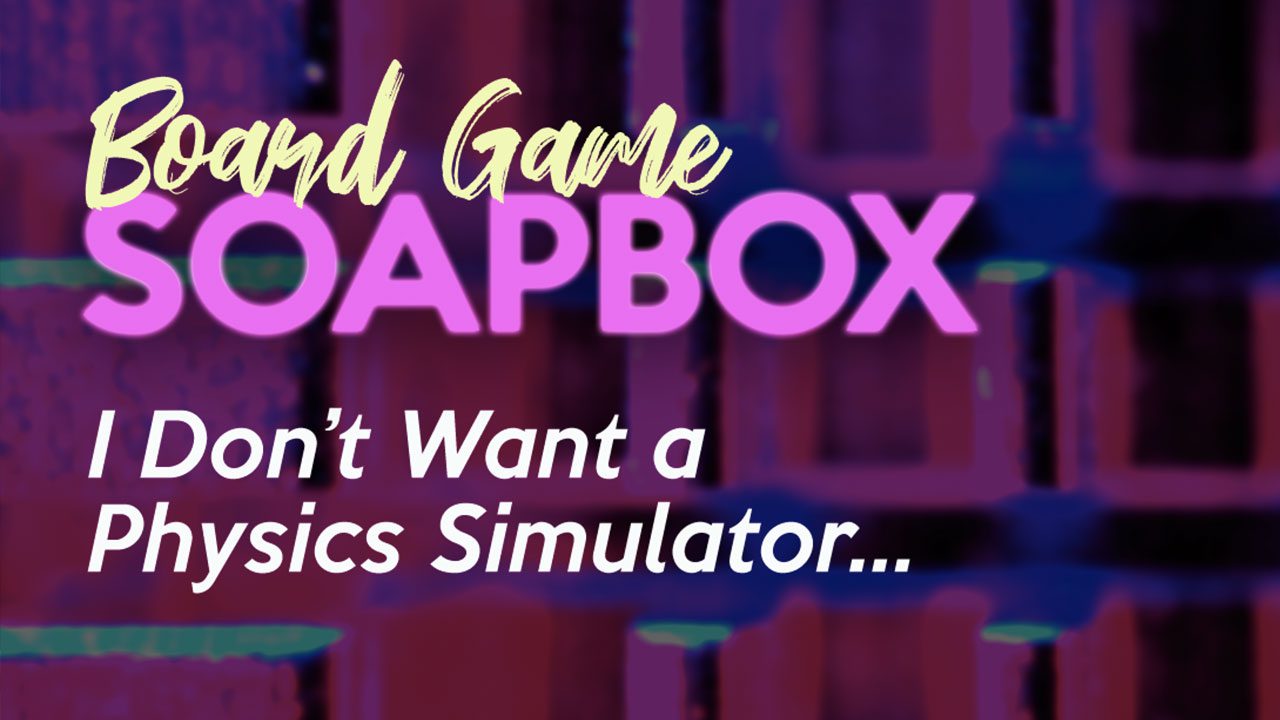There’s this feature on Tabletop Simulator: if you feel like being a bit of a rascal — a scallywag — a miscreant, even — you can flip the table. Pieces fly everywhere, scattered into an infinite void. It’s only temporary, of course; wait a few seconds and everything will neatly reappear right where you left it. It’s a cute little trick to show off the physics engine.
Now, don’t get me wrong. You may have read the title of this article and thought I was going to straight dunk on a whole swath of digital games. And you’re damn right I am. But for the sake of argument, let’s take a look at some of the reasons why this style of digital play has become popular.
Why Are Physics-Driven Game Systems Popular? And Also, Uh, What Are They Again?
Depending on how much of a nerd you are, you may be familiar with the idea of a physics engine. If you aren’t, I’ll sum it up for you as quick as I can: video games need rules to tell them how objects interact. If this sword is dropped, what happens? If you crash into this wall, what happens? If you throw a wheel of cheese at this child, what happens? The physics engine is responsible for setting the rules that tell a game what to do.
Two of the major board game systems — namely, Tabletop Simulator and Tabletopia — make use of physics engines like these to serve as the backbone for their games. Drag a card, drop it on the table, put it in your hand, flip it over: all these tiny actions we take for granted in real life need to be programmed to act as we would expect them to when we simulate them in a digital space. Physics engines can serve as a good starting point for that. When you already have code for how to add a card to a player’s hand, how to drop a token in a bag, and how to shuffle a deck of cards, you’ve got a good head start towards realizing your vision.
So imagine you’re a game developer, sitting at home with your Mountain Dew and your Cheetos and your extremely sci-fi-looking chair and your other convenient stereotypes. Which of the following scenarios sounds better to you?
- Spend a few weeks (or a few months) developing all the ifs ands & buts of the game’s rules. Puzzle out some custom code so that the game knows whose turn it is, knows where a card goes when you select it, knows what it means when you click on that token (in the third phase of the round). Do all this within the framework of one of the online interfaces developed for this purpose, knowing that the webmasters may be pretty selective about what they allow on their platform. If they don’t want your hard-earned code, set up a custom URL, keeping it under the nose of the publisher so they don’t know you’re pulling revenue away from the app they may or may not have in development.
- Upload the game assets to Tabletop Simulator or Tabletopia, making use of the existing physics engine to get the game running. Designate a few spots for cards or tokens to snap to, set up the start state of the game, and baby, you’ve got a stew going.
What I’m saying here is that it’s a heck of a lot easier to develop a game for a physics engine than it is to program a game from the ground up. It just makes sense that folks would gravitate towards these physics-driven systems for rapid prototyping, replicating their favourites online, and hacking together a game that isn’t available elsewhere.
But all that being said, allow me to voice my objection: I hate them, dude! They suck!
(Why) I Hate Them, Dude! (And Why) They Suck!
1 – It’s a reminder.
If there’s one thing that physics-driven board games are excellent at doing, it’s reminding me that I’m not playing a real game. Every delicate drag of the mouse, every microscopic maneuver of a victory point marker, every careful camera rotation — they all serve as ever-present reminders that you are NOT PLAYING A REAL GAME. You are a GHOST IN AN IMAGINARY LAND. Your FINGERS are the VESSEL by which your ATROPHIED QUARANTINED BODY may INFILTRATE THIS DAMNABLE PLANE.
Until we have widespread VR, it’s never going to be convenient to simulate these virtual spaces. Even then it’ll probably give me motion sickness.
2 – It hurts.
Clicking and dragging is a particular scoundrel of mouse use, associated with higher strain on the hand. It’s a popular mechanism in board game simulations, and one that can be directly tied to carpal tunnel. Look, folks: with the amount of time we’re all spending in front of the computer these days, I don’t need any more stressors on my withered forearms. I know that there are plenty of keyboard shortcuts that people can use to make their experience a little easier, but it’s a band-aid on a problem, and that problem is physics-driven play.
3 – It’s not smart enough to know who’s winning.
Specialized board game apps along with game platforms like Yucata and Board Game Arena have a few things going for them. The biggest of these is that the game knows who’s winning. These games are hard-wired: they’re programmed to operate by the rules and it’s impossible not to play by the rules.
I don’t want to seem untrustworthy here, but it’s worth saying out loud: much like in real life, physics-driven board games require some level of comfort that the people you’re playing with are going to honour the rules of the game. I do generally trust my fellow players — but I also know how easy it is to accidentally dump your hand or chuck a token off the edge of the table. And honestly, when I’m already trying to remember what shortcut I assigned to zip me over to the player aid, I don’t want to strain to remember whether Sarah87 was at 21 points or 22. And Sarah87 might not be trying to cheat! She might just be playing wrong. But it’s hard to track anything in a shrunken, screen-sized view of a game.
I’ll make it really simple: board games have rules. Video games have laws. You can’t bend rules in a video game because the game’s parameters won’t let you — by and large, anyway. So it just makes sense to take advantage of the medium you’re operating in. If we can create a space that only offers legal moves and automatically tracks your score… shouldn’t we?
4 – It doesn’t honour what makes physics engines fun in the first place.
A good physics engine has the power to do many things. If you’re playing an open world adventure like The Legend of Zelda: Breath of the Wild, it offers you the opportunity to solve problems in interesting ways. Goofy games like I Am Bread and Goat Simulator can have you rolling with laughter at the emergent comedy from the interaction of their engines and their simulated worlds.
I won’t go so far to suggest that the existence of board game physics engines somehow takes away from these beautiful pieces of art and math. But you have to admit — it sure feels like a sad consolation prize when you hold them up beside each other. I would hate for someone to think that physics games have to be as tedious as these simulations make them, if this was their only exposure to them.
A Concluding Statement That Ties All This Together
I imagine that when you flip the table in real life there’s a period of reflection and embarrassment after the heat of the moment has faded away. You need to help collect the pieces and apologise to your opponents. Having never done it I wouldn’t know, but it’s a gesture that carries with it a huge weight of meaning and consequence. It absolutely, categorically says something about you and how you feel, and the repercussions of that dramatic outburst last.
Tabletop Simulator makes that act hollow and devoid of meaning. It robs one of the social taboos of tabletop gaming of its consequences and in the process changes everything about how we as gamers play. For me, this cute little trick is a symptom of the malaise of physics-driven digital board games, the tip of a terrible tabletop iceberg.
I’ve flipped the physics-driven table in this board game soapbox. Now for the part that follows such real-life drama.
Physics-driven digital board games are maybe the least important thing to complain about in 2020. I get that.
Still, I’m choosing to write this article in the hope that someone else out there has played these games and thought, “I don’t know why, but I kind of hate this.” Maybe now you have a better idea of why. Or, at the very least, you know there’s someone else who feels the same way.
To all the devs who have worked hard to make these games come alive: I see you, and I respect the time and effort you’ve spent bringing these online. For many folks, you’ve provided an avenue to keep enjoying the hobby they love so much in a time of hardship and solitude.
Me? I’m gonna stick to cardboard. Well, that and online games that don’t make me feel like I’m playing Getting Over It with Bennett Foddy.











I could not say that I disagree more.
In reality are we all just physics engines. And we figured out special shortcuts to such that our brain to make things better and quicker
I used to not like the physics engines because I didn’t know how to use them I wanted to play them like I play a board game and I had to remember I want to computer there are tons of shortcuts that make these games so much easier and honestly better in many cases.
My wife and I have begun to realize that we are spoiled by these . simulator’s. If you make a mistake and a simulator all you have to do is hit a button and it undoes it those back to the next turn you can see what everybody did.
I can push a button and we can have a new game started right after the other game the ability to play things so much faster as opposed to setting up some games that can take anywhere between 15 to 45 minutes.
Not to mention that so many games have players take actions in such on their turn and a lot of times that goes unseen when I’m in real life but online I have no choice but to see what everybody’s doing.
Glad to hear the other side of the coin! You would think I would love all the shortcuts — hotkeys are basically my favourite thing. ALAS. Thanks for sharing your take.
My friend posted this link and said it sounded like something I could/would have written. I heartily agree with all your points.
Then I have found my people! Haha. Thanks, Nathan.
Amen! I tried to play one game solo on tabletopia when i dicovered it and just ended up throwing cards all over the table. The experience was enough to not go back. I also decided to stick to cardboard.
I’m commenting on a two month old article because I googled “why does tabletop simulator have physics” and clicked till I found someone who kind of agreed with me. Thanks for sharing.
I’m often stunned at the popularity of TTS. I play it if it’s the only option available to do a game online cause it’s better than nothing, but it tends to annoy me. I feel like it was made for some viral videos of table flipping and pieces knocking around and then somehow stuck around by inertia.
Unless I’m playing Crokinole, I don’t need physics in my board game, period. Being able to toss pieces around adds nothing to almost all board games. Meanwhile, because it’s a “physics simulator” certain features that would be really useful are near impossible: namely, an undo button and a well organized turn log. Mashing the “rewind” button that records game states from every 5 seconds is a horrible way to try to fix things — and needing to fix things is relatively common, given that most workshop games are sandboxes with no enforced rules. 99% of tabletop games are turn based experiences, not real time, so having the whole thing be a real time seems completely unneccessary to me and just detracts from the experience.
It probably doesn’t help that my friends are jokers who like messing with the objects constantly. I’m a grognard who’d rather be in VASSAL, but it’s easier to get my friends into Tabletop Simulator, so here we are.
That people can just make the assets and not have to code any of the actions is a good point though: I’d never thought of it that way. However, a lot of times it gives me a square peg — round hole feeling: when people put scripting into custom games, it just ends up interacting weirdly with things. Tried playing a scripted version of Power Grid earlier today before giving up and switching to a sim’d version with just the assets because although the scripts actually seemed pretty good by TTS standards, there was no way to revert them. You could rewind the table state, but it wouldn’t actually undo the script state, which made it exceptionally difficult unless no one misclicked ever because you couldn’t revert game phases in the calculations. Obviously this is just some dumb third party stuff, but I feel like there’s lot of talented programmers and hobbyists trying to make things work in what ultimately just…..isn’t really a very good board game engine.